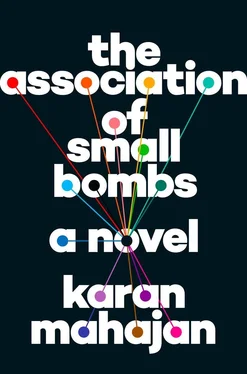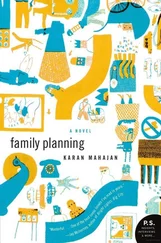“You’ve got tons of microtears in your wrists from typing,” Laurie, the physiotherapist, concluded, when he went back to see her. “These things build up over years. You get injured, you develop a compensatory posture when you type, and bam! — years later you have herniated discs. When did you start using a computer?” she asked.
“Twelve,” he said. He had got a 486 right after the blast — he had got so much after the blast!
“There you go — all those years of sitting still, hunched over, not taking breaks.” She told him he had carpal tunnel, an incurable condition. “Though it can be controlled and improved,” she assured him.
He was essentially crippled. Walking around the bright campus in a daze, he felt his right leg and right arm and left wrist go numb.
Free from India and still plagued by pain! After all these years! He’d changed his mind about the bomb so many times. Of course it was a curse to have witnessed that explosion, to have suffered so vividly — to have so many things opened to him at once: death, a woman’s hanging breast, the cowardice of men and women who ran screaming from the market. At other times — the blast had improved his life, hadn’t it? He’d eked a spectacular college essay out of it — the dean himself had congratulated him on it when he’d arrived. Now he played the essay back in his mind: those homilies and banalities he’d penned about terror, the death of his friends, communal harmony — bah! Maybe that was why he was suffering now: he’d tried to take advantage of a tragedy. His mind darkened. When it comes to cause and effect, he thought, I really do believe God exists; I really do think God is watching, drawing his conclusions, doling out consequences. Sometimes I don’t even know I’ve committed a sin till a punishment comes along.
After all, he wouldn’t have been typing so much if he hadn’t been in the U.S., where everything ran on computers, where the Internet was available on tap and the electricity never went out. And he wouldn’t have been in the U.S. without the essay. You have to stop thinking like that, he told himself. You did almost die. He saw again the small child with flaring red-hot fragments around him, the screams, the stampede, the cowardice of a whole society stripped bare. Most of the people who had learned these lessons about their country and city died seconds later, as if the bomb existed to prove to them, in their final moments, that they had lived a useless life in a useless place.
But the pain did not go away; it got worse. In the middle of his third semester in college, unable to function, he returned to India to recuperate.
“How can it still be there?” his mother asked the doctor at the clinic in Safdarjung, blinking furiously.
The doctor was a stately Sikh who dressed in white shirts with matching white turbans; he worked with a lot of embassies. The great endorsement of anyone in Delhi: he works with embassies.
“Sometimes it takes years to heal,” he said, clearly occupied by other problems: financial ones, maybe; he had an undoctor-like anxiety in his eyes.
“I don’t understand why it’s coming back now, at this moment. The last time we came, if you remember, the checkup said everything was OK.”
Mama , Mansoor wanted to say, it’s not his fault.
The patient sardar doctor gave a long explanation about pain and muscle growth and computer usage.
And so Mansoor was consigned again to the cube of curtains, back again with Jaya telling the same proud, unbelieving stories about her brother in Houston — only this time he was older and taller, five feet seven, the bed barely fitting under him. And he felt not comfort in the balmed air as he had in the past, but panic — panic that life was passing him by.
________
It was at this time that the Khuranas invited Mansoor over for tea.
“Why do they want to meet me now?” he asked, suspicious, in pain, churlish.
“They’re curious about you,” his mother said. “You’re a grown-up now. They want an individual equation with you.” She became dreamy speaking about the Khuranas.
“Yaah but—” Mansoor was not convinced. He argued and debated the visit with his mother. Finally, on a windswept, befogged afternoon, the sort in which all of Delhi is wearing a sweater of atmospheric dirt, he went over with the driver to see the Khuranas.
The Khuranas still lived in the old flat in the Khurana complex, with the large windows looking out onto the mansions of Maharani Bagh, and the sofas rearranged to create an illusion of progress. The Khuranas welcomed him with a big tea — samosas, pakoras, granular chutneys. They hadn’t aged much either — tragedy had given them an odd guilelessness, Vikas Uncle looking hyper as ever with his large buzzing forehead and thinning hair, the black pencil mustache imported from the Kissan Ketchup commercials, which, Mansoor now remembered, he had directed; and Deepa Auntie thin and shy and self-effacing, constantly wiping her upper lip with the end of her sheer dupatta, smiling, her crooked teeth showing through the cloud of cloth. As for Anusha, she must have been five now. Round-eyed, cute, a tiny black twist of a bun spilling out from her boyish hair, she walked about with her back excessively curved, slapping the ground hard as children do.
It was weird to be back here, accepting tea, flinching from the pain in his right wrist.
After asking him about his injury, the Khuranas, obviously glad to talk to someone who didn’t need background, filled him in on the details of the trial, which was still going on — in its sixth year. The adjournments were ridiculous, they said. The government had let them down repeatedly. The prosecutor had been arrested for sexual assault. One session was called off because a stray dog wandered into the court and bit a policeman. Worst of all—“No word about the compensation.”
“Still?” asked Mansoor, his teeth jumping from the overly sweetened tea, the dust of the city pouring into the drawing room from all sides in long mineral sunlit shafts. The glaring sunlight of Delhi — he had not missed this in the U.S., not one bit.
“Ask your papa,” Vikas Uncle said, snorting. “Nothing. He and I’ve both gone many times to the thana. But the blast happened at such a strange time — the BJP had only been in power for a week and they were gone a week later — that no one took responsibility for it. That’s also luck.”
“But it’s not that much, is it?” Mansoor said and immediately regretted it. They were not as well off as he was.
“It’s a matter of principle,” Vikas Uncle said.
Though he looked devastated.
“Yes, of course,” Mansoor said, feeling bad. “I should look into it as well. I was so small then, I had no idea what was happening.”
“They should be paying you for these wrist problems you’re having,” Deepa Auntie said, piping up from her large sofa chair. “We would get them to pay for Uncle’s back problems but he wasn’t present, so it doesn’t count.” Mansoor had heard about Vikas’s back — how he suffered debilitating pain. But he didn’t connect it with his own pain.
Mansoor sat shaking his tense head, ingratiating as always.
Suddenly, Deepa Auntie started crying.
“Auntie,” he said.
“It’s OK,” she said, wiping her nose with the back of her hand.
He bent over his tea, his wrists aching. He knew he brought back memories of her boys — how could he not? His whole existence was a rebuke to the idea that their deaths were inevitable. Why them and not him? Why two of them and zero of him?
“You’re wrong,” his mother had said, when he’d said this to her before leaving. “They want to see people who remember the boys.”
Читать дальше












